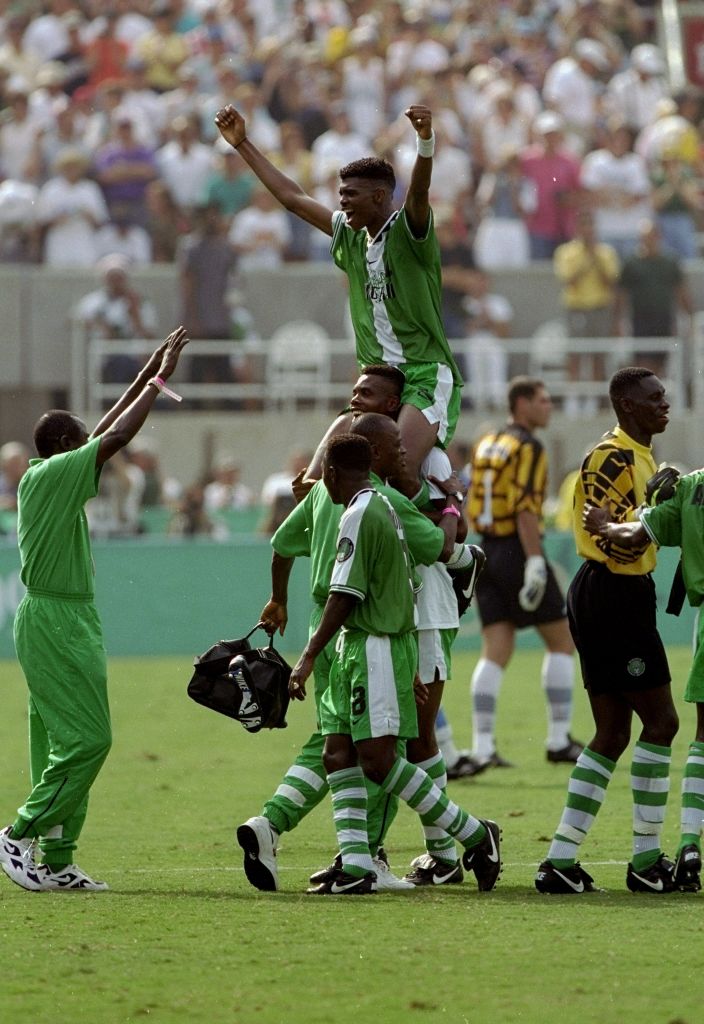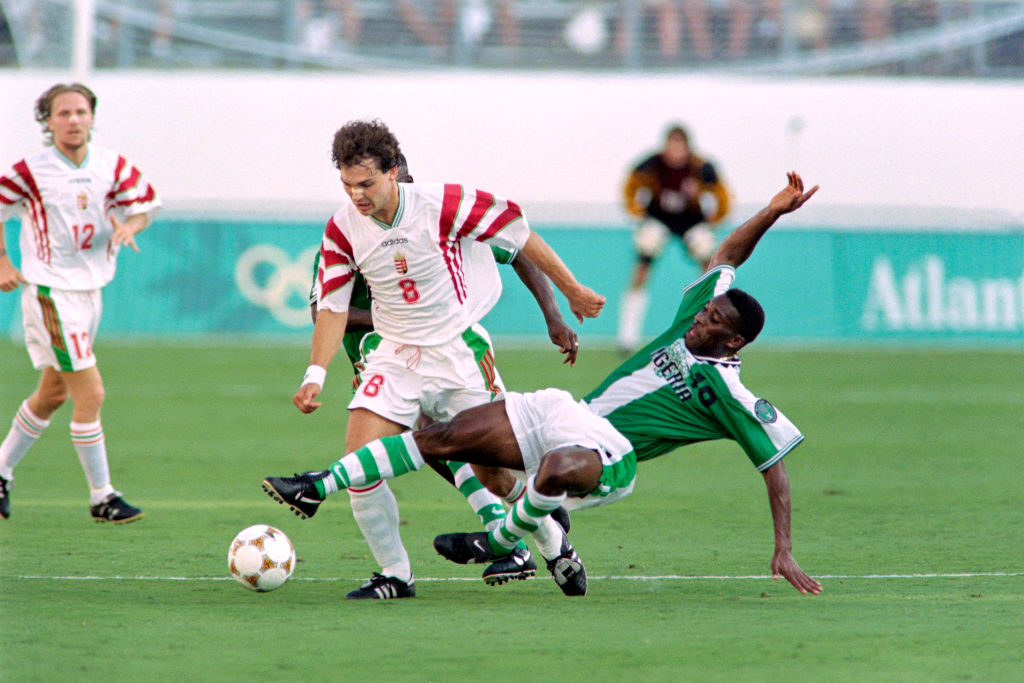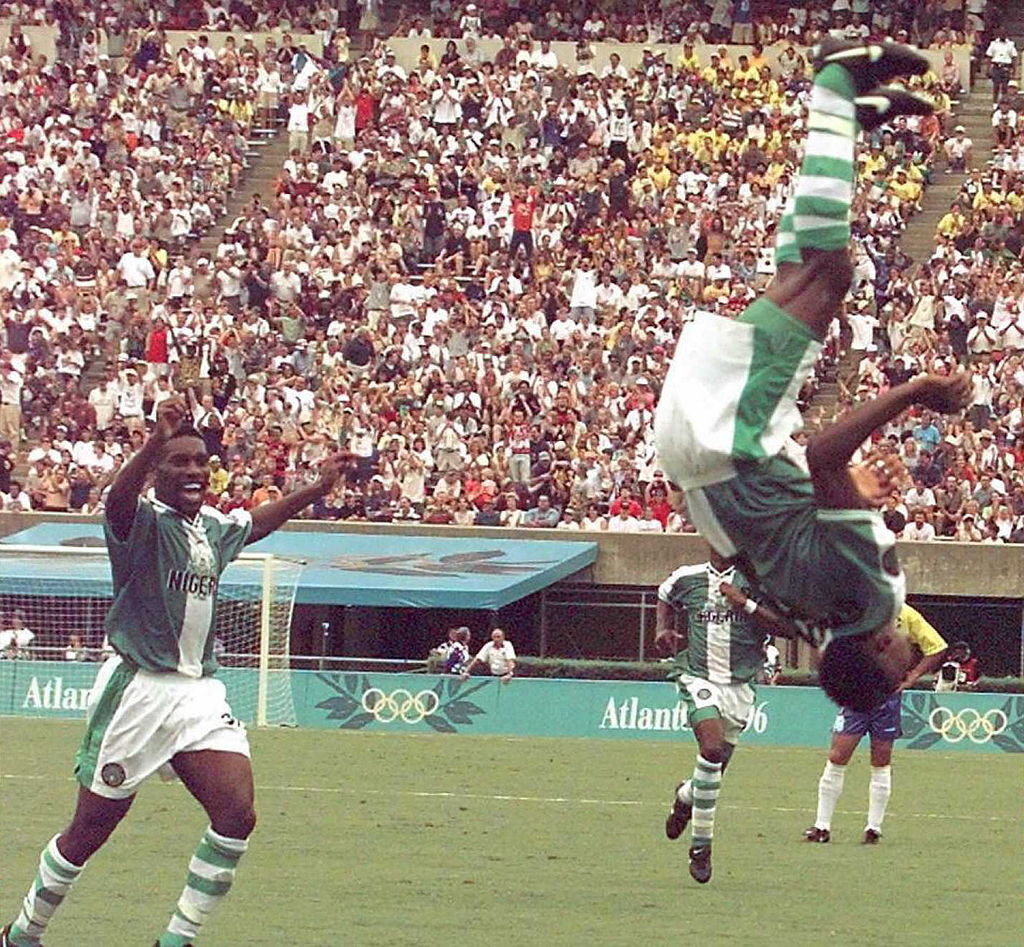
For Nigerians, 1996 lives in cultural memory as the year its soccer team, the Super Eagles, became global icons during the Summer Olympics. And, 25 years later, it’s clear that team had an impact that stretched far beyond the nation’s borders. Nigeria’s Dream Team was responsible for cementing the country’s place as a soccer nation worthy of considerable regard to opponents beyond the continent. Moreover, the nation’s path to gold involved defeating the best soccer team in the world at the time, Brazil—a feat players and fans recall as not just a victory for Nigerians, but one for Africans as a whole.
So, though Nigeria isn’t playing soccer in Tokyo, the Olympics are still meaningful to the nation’s fans. That August day in 1996 when Nigeria won gold would change the state of African soccer forever.
Read more: 48 Athletes to Watch at the Tokyo Olympics
Before the Olympics that year, Nigeria had made inroads in the sport, having won regional competitions on the African continent since 1980. Two years prior, the country had won the African Cup of Nations (AFCON) in Tunisia, their second time lifting the trophy, and also left an impression at the 1994 World Cup, the first hosted by the U.S. and still the record-holder for the most attended FIFA event in history. The Super Eagles lost in the Round of 16, after Italy’s Roberto Baggio scored a penalty in extra time—but had they won their match and gone on to the quarterfinals, they would have been only the second African team then to do so, after Cameroon in 1990.
But by 1996, it seemed that Nigeria’s hopes of becoming a world soccer power would be dashed by political realities. The country was subjected to the tumult of the brutal military government of General Sani Abacha, and the team hampered by the infamous lack of organization on the part of the Nigerian Football Federation (then called the National Football Association or NFA), as well as the pervasive national problem of tribalism.
Just six months before the Olympics, as the AFCON tournament was about to commence in South Africa, Abacha ordered the national team to withdraw. Officially, the two countries were experiencing diplomatic tensions and Abacha said he feared for the Super Eagles’ safety. But the move was widely seen as a response to South African President Nelson Mandela and his administration’s vocal criticism of the Nigerian leader’s human rights abuses, which had intensified after the execution of prominent environmental activist Ken Saro-Wiwa, in 1995.
The decision was heartbreaking for the Super Eagles, says Victor Ikpeba, a Nigerian forward who went on to be named African Football Player of the Year in 1997.
“Political decisions are made, and when it’s done, it’s done and dusted,” Ikpeba says. “It was just a waste of opportunity, because it was a generation of great players we had there, and we couldn’t defend our title.”
So, with the centennial Olympics taking place in Atlanta in July and August, the Super Eagles were determined to showcase what the world had missed out on at AFCON. But first, they would have to overcome a laundry list of hurdles brought on by the NFA, such as pay and benefits that players— including Ikpeba—say went unpaid to the squad and coach Jo Bonfrère, as well as the association’s interference in picking the team (based on tribalism, again according to Ikpeba and other players) and inadequate provisions for the team’s preparations. (The current Nigerian Football Federation opted not to comment for this article.)
“Believe me, in my whole career as a soccer player, I think we’ve never had it so difficult to prepare for a tournament. We practically lacked in everything,” says Sunday Oliseh, then Nigeria’s defensive midfielder. “We lacked in equipment, infrastructure, we lacked even in things as little as medical facilities…we lacked in food, we lacked in everything, so we were just like abandoned children.”
In his book Audacity to Refuse, released in April this year, Oliseh details the failures of the NFA and the persistent lack of funds that resulted in individuals players using their personal money to pay for team necessities, ranging from vans for transportation to training grounds—some of which the players drove themselves—to hotel stays. Documenting his professional career in the book, Oliseh paints a damning portrait of that era’s NFA. Oliseh, who was raised in Lagos but comes from one of Nigeria’s minority groups—the Ika people—is also forthcoming about the role of ethnic divisions, a sometimes problematic factor in a nation that is home to hundreds of ethnicities but where power and privilege tend to be concentrated among a handful of influential groups.
“I think football does not exist in isolation, let’s not deceive ourselves. So, if you’ve got a national team that doesn’t seem to get along, it’s kind of like an image of the country itself,” he says. But, he says, while tribalism may have helped a few players get started in their careers, it wouldn’t have been enough to get a player into the first eleven. For that, you just had to play.
Ikpeba, from another minority group, the Isoko, also notes that in some ways, soccer served as the unifier for the players and the nation.
“Nigeria is a very tribalistic country, we cannot run away from that…but when it comes to football, everybody puts aside the tribalism we have back home,” he says. “Everybody becomes united when the Nigerian national team is playing.”

Given what the team had been through in the lead-up to the Olympics, it’s perhaps not surprising that the players arrived at the Olympics in 1996 with modest hopes—even after winning their first game in the group stages, beating Hungary 1-0. In Group D, which also included Brazil and Japan, Nigeria only lost to the Brazilians, the tournament favorites. And yet, according to winger Emmanuel Amunike, at that point the team was still aiming mostly just to make it to the final round.
“There was a confidence in the team that we do the needful, if we can play as a team, then there’s a possibility of…achieving something meaningful,” he says. “But we never thought we were going to win the gold.”
Attacking midfielder Jay-Jay Okocha, heralded for his stupefying skillfulness with turns and step overs that exasperated many a defender throughout his career, agrees, saying Nigeria initially limited their expectations to making it to the next round.
“You always set targets in stages. Our primary target then, was to come out of our group. And especially when we lost to Brazil, we knew that we had to do more,” he says.
And they did. After qualifying from their group—along with Brazil—the Super Eagles overcame Mexico in the quarterfinals, 2-0, and then found themselves in the semifinals, once again facing Brazil. Many people imagined Brazil would easily defeat Nigeria. But, according to Okocha, each win for the Super Eagles had inspired more confidence in the team.
“Typical of a Nigerian team, we always grow as the tournament goes on because we blend more, we have more to work on. By the time we got to the semifinal, we already were a better team. Mentally, as well,” he says.
The team’s mental boost might have also been augmented by the support they received from fans. The Nigerian community in the U.S. rallied around them, and it didn’t stop there. Ikpeba remembers feeling a sense of comradery from Black Americans in particular, though he notes that white fans made the team feel welcome too. “Black Americans took us as one of them,” he says. “I can tell you, they were very supportive of us.”
On the day of the match, Brazil began performing how all the pundits said they would: Within the very first minute, they scored a goal, which was followed up by two more before the end of the first half. By the intermission, the score was 3-1 to Brazil. In fact, Nigeria first got on the scoresheet courtesy of an own goal from Brazilian defender Roberto Carlos.
Get your history fix in one place: sign up for the weekly TIME History newsletter
In the second half, the game changed—especially after Brazilian player Ronaldo was substituted. Perhaps it was overconfidence from the Brazilian team or perhaps it was a strategic move in advance of the final, to rest the best player in the world at the time. But either way, Nigeria’s play drastically improved and, with a 78-minute goal by Ikpeba and a 90-minute strike by forward Nwankwo Kanu—who even then showed signs of the superstar he would eventually become—the Super Eagles brought the score to a 3-3 draw at the end of the regulation period. The teams would have to go into extra time.
The game wasn’t all that was on some Nigeria fans’ minds that day. Argentina had beaten Portugal 2-0 the day before, and on the morning of the Nigeria-Brazil game, the Argentine sports newspaper Olé published a front-page headline that read, “Que se vengan los macacos”—which translates to “Let the monkeys come.”
Although there was a strong likelihood the racist implication was mostly directed at Brazil given the countries’ rivalry—and the fact that most people expected them to win—Nigerian communities imagined they too, were the targets. The players, however, were focused on the pitch. “We were not reading the papers, so we had no idea what was going on,” says Okocha.
And there, in the 94th minute, the Nigeria-Brazil semifinal was decided by another Kanu strike, a “golden goal” that ended the game due to the sudden death rule. Nigeria had beaten the mighty Brazilians.
“When we defeated them, it was kind of a big shock to the whole world and to Brazilians, but we had good players,” Amunike says. “Kanu was so exceptional with a whole lot of talent…but we had a team where we were…disciplined enough to play as a team, not individually.”
The semifinal performance inspired an unofficial national song called “When Nigeria beat Brazil” that is still sung in stadiums today when Nigeria plays.

The Super Eagles would be the ones facing Argentina on Aug. 3, as the first African team to be in the finals of the Olympic soccer competition.
As in the match against Brazil, Nigeria started slow against the Argentines, the latter scoring a goal in the first few minutes, courtesy of forward Claudio Lopez. But by the end of the first half, the score was 1-1, thanks to a header by defender Celestine Babayaro, never shy when he went on the attack. A high-spirited game throughout, the second half was electrifying. Nigerian defender Taribo West, always recognizable by his ostentatious hairdos, conceded a penalty to the Argentines five minutes into the second half, allowing them to take the lead, 2-1. Coming on for Ikpeba in the 72nd minute, forward Daniel “the Bull” Amokachi would get the equalizer for Nigeria within two minutes of the substitution. The score was 2-2 with just over 15 minutes left. One goal stood between second place and gold.
Then, in the 89th minute, Nigerian midfielder Wilson Oruma took a free kick. The Argentine defense attempted to play the Nigerian attack offside, which could have stopped play in their favor, but Amunike struck the ball, and won the match for the Super Eagles.
Nigeria, against all odds, was the Olympic gold medalist in soccer.
“We had done the best when nobody even expected us. Had it been we lost in the final, well, we would just be one of those teams [where people say] ‘It’s okay, you guys tried, getting to the final,’” Amunike says. “But you know, winning the medal, pulls a lot of attention, brings in a lot of surprises and then, people begin to pay attention to Nigerian football… [and to football] on the African continent…I’m happy that I was part of that history.”
For Ikpeba, coming first in a tournament in which an African team had beaten two of the presumed best teams playing, the win was a signal to the rest of the world to be more attentive to teams coming from the continent. Although Nigeria itself has not gone onto win the Olympic gold again in men’s soccer, Cameroon beat Spain to become gold medalists in the very next Olympics, in Sydney. And a new generation was inspired by those victories and the players’ star power, fostering a wave of soccer talent throughout Africa.
“I think the South Americans and the Europeans [had] never respected African football. They felt we are progressing, but not good enough to compete against them. And that’s a lack of respect,” Ikpeba says. “I’ve been thinking about this for 25 years, that fighting spirit we had, not giving up, it’s amazing.”
Twenty-five years later, the Super Eagles class of ’96 is still considered among Nigeria’s best teams, and coach Bonfrère remains a beloved figure in the country.
Having brought joy to a nation against the backdrop of a harrowing political environment, and overcoming chaotic planning in the process, Nigeria’s victory ultimately went beyond the nation’s borders.
“It was not only a Nigerian success, it was an African success, it was a Black-race success in football,” Ikpeba says. “What we did 25 years ago, nobody gave us a chance…we did the impossible.”
More Must-Reads from TIME
- Why Biden Dropped Out
- Ukraine’s Plan to Survive Trump
- The Rise of a New Kind of Parenting Guru
- The Chaos and Commotion of the RNC in Photos
- Why We All Have a Stake in Twisters’ Success
- 8 Eating Habits That Actually Improve Your Sleep
- Welcome to the Noah Lyles Olympics
- Get Our Paris Olympics Newsletter in Your Inbox
Contact us at letters@time.com